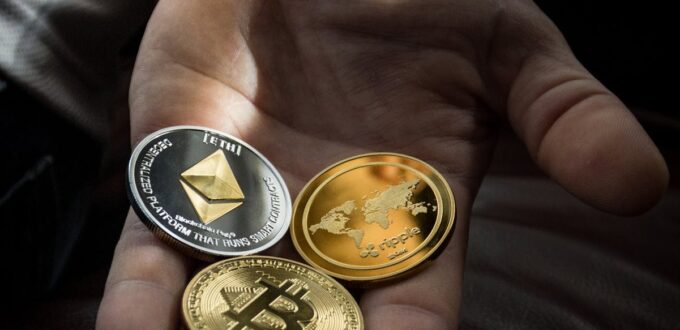India has seen and gone through many technological reforms and switches ranging from making digital payments to setting up online businesses. Many activities in our everyday lives have been combined online, making them more flexible and effective, thanks to the rapid advancement of information and communication technologies.
A massive increase in the number of online users has triggered virtual word notions and spawned a new business phenomenon known as cryptocurrencies to enable financial transactions such as buying, selling, and trading.
Cryptocurrencies are digital representations of valuable and intangible commodities that can be utilised in a variety of applications and networks, including online social networks, online social games, virtual worlds, and peer-to-peer networks. In recent years, the use of virtual currency has extended across a wide range of technologies.

Crypto investing India
The net market value of cryptocurrency is estimated to be around $ 3 trillion, and nearly 10 crore Indians have invested in it, totalling nearly 6 lakh crores. Cryptocurrencies, according to the IMF, are the next step in the evolution of money, while blockchain, according to the World Bank, will usher in a new technological era. Indians have put in 15 crores in cryptocurrency, according to recent data. It’s difficult to overestimate their economic significance in India. Alternatively, you may say no.
The user’s expectations for the future of cryptocurrencies are examined in this article. It also investigates users’ confidence in dealing with bitcoin at a time when the use of such virtual money is not entirely regulated.

Effects of crypto currency on the nation if legalized:
- Relief for underdeveloped countries like India:
India’s largest donation during Covid-19 came in the form of bitcoin; similarly, in the future, many companies will be able to receive money in the form of cryptocurrency, which formerly came in the form of US dollars. Consider what would happen if an investor from another country invested in India. Today, investment is made in US dollars, which raises the question of why are we strengthening the US dollar.
Because the US dollar has become a universal currency, demand for it is increasing, as is its value, allowing the US to benefit from having its currency as the global standard, but at the expense of developing countries like India. However, because crypto is not limited to any one nation, This benefit will not be limited to a single country but will be democratically distributed to a large number of countries.
- Legal tender for cryptocurrency:
Even if the government recognises cryptocurrency as an asset, it is unlikely to accept it as legal cash.
This means you can’t just stroll into a restaurant and expect to be able to pay in bitcoin. Of course, some businesses can and have begun to accept cryptocurrency payments, but this is a decision that they must make on their own and cannot be coerced. This also means you won’t be able to take your bitcoin to a bank and have it turned into rupees. Only a cryptocurrency exchange, where interested buyers and sellers swap cryptocurrencies for rupees, can carry out such a transaction.

- It’s impossible to overlook:
Even in its infancy, India’s crypto industry boasted over 300 enterprises and 60 lakh investors who collectively invested millions of dollars. This is despite the fact that only 2% of the Indian population uses cryptocurrency! It has the potential to transform the Indian economy if policymakers support it.
- Contributes to job creation:
Blockchain technology (and thus cryptocurrency) allows for transactions between unknown and known parties. This is an unique skill set that is already in great demand due to the industry’s newness and growth. All in the name of assisting entrepreneurs.

- Join forces with the IT sector:
India has a strong and dependable IT infrastructure. The opportunities for collaboration to strengthen the blockchain network here are limitless, resulting in an infusion of foreign capital. Who knows how AI and the Internet of Things (IoT) will converge with blockchain now that they’ve grown out of their infancy? That would be an ideal environment for future tech behemoths.
- Zero reliance on middlemen:
A decentralised system has a number of advantages, including removing the need for middlemen. Minimal corruption and rapid, traceable service delivery are promised by digital transparency. If only the government could help through new legislation and policies, things would be a lot better.

The Reserve Bank of India has issued a strong warning about the use of digital currency for money laundering and terrorism financing. However, it appears to be the way forward as a worldwide phenomenon, and even the Supreme Court appears to agree. Security of data is a problem, but it is not insurmountable. That is evidenced by the increasing graph of investors.
– Advertisement –

No Comments Yet